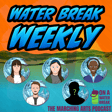
OAWB with Drill Writing Comedy Star Tony Deyo
Go On A Water Break with Comedian and part time Drill Writer, Tony Deyo. Tony tells us his marching arts history and all that goes into his comedy now. From his appearance on Conan O’Brien to his time as a high school band director, he gushes about it all.
Guests:
Tony Deyo - @tonydeyo & tonydeyo.com
Listen to the main episode to keep up on everything going on in the marching arts with our hosts:
Jackie Brown - @spintronixguard
Stephen McCarrick - @stephenmccarick
Cindy Barry - @leandermomma
Nicole Younger - @o2bnpjs & @thecookoutcg
Trevor Bailey - @t_pain151
Trish O’Shea - @trishdish1002
Beth Beccone - @bether7189
Chris Rutt - @wildhornbrass1
Cynthia Bernard - @cynthiabern
Ashlee Amos - @famousamossss_
Theo Harrison - @harrisontheo07
Stephanie Click - @stephanieclick
Whitney Stone - @dancerwhit
Justin Surface - @J_dex07
Ashley Tran - @itsashleytran
Jack Goudreau - @goudreau_
Ricardo Robinson-Shinall - @ricardorrobinson
Callie Quire - @cnquire
Austin Hall - @Austin_hall10
Jose Montes - @joeymontes57
Music provided by leydamusic.com Follow him @josh.leyda
Avatars provided by @tch.makes.art
#marchingband #colorguard #dci #podcast #onawaterbreak



















